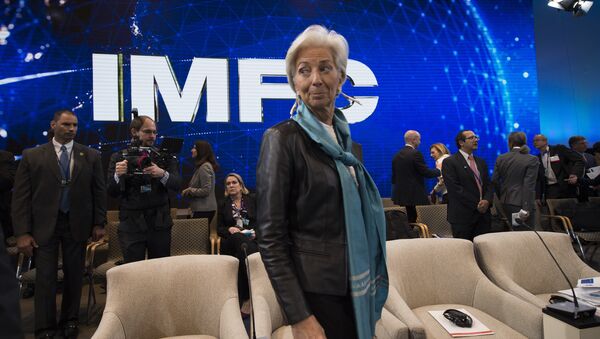Greece has been given tough targets to reach in order to qualify for each stage of the bailout deal — its third since the sovereign debt crisis of 2007/8 — which calls for tough cuts in public spending, raising tax income and major reforms of its over-generous state pension scheme.
Thousands of protesting pensioners march to the Ministry of Labour in Athens#Greece pic.twitter.com/HCOimlp0xt
— Savvas Karmaniolas (@savvaskarma) April 4, 2017
The latest disagreement is over the pension issue. Under the terms of the agreement, Greece has got to keep a 3.5 percent of GDP budget surplus before debt servicing costs over several years starting in 2018, according to Reuters.
#Germany FinMin Schäuble says he's optimistic on reaching a solution on #Greece programme's second review 'soon'.#Eurogroup
— Yannis Koutsomitis (@YanniKouts) 6 April 2017
Many within the EU believe Greece will also keep the 3.5 percent surplus in 2019, but the IMF is divided over the issue. According to the latest assessment of the Greek bailout, the board of the IMF is split over the targets.
"Most Executive Directors agreed with the thrust of the staff appraisal while some Directors had different views on the fiscal path and debt sustainability. Most Directors agreed that Greece does not require further fiscal consolidation at this time, given the impressive adjustment to date which is expected to bring the medium-term primary fiscal surplus to around 1½ percent of GDP, while some Directors favored a surplus of 3½ percent of GDP by 2018," the IMF statement said.
"While most Directors favored a budget-neutral rebalancing, some Directors considered that the reforms could underpin temporarily higher primary surpluses, provided that they are implemented once the output gap closes so that the impact on the recovery is minimized," the IMF said, clearly showing divisions over the bailout package.
The latest row between Greece and its creditors has arisen over pension reforms. Under the bailout deal, Greece will have to increase slightly the payout for the lowest pensions, but will slash 40 percent off the highest, with an overall cut of 15 percent.
Meeting with the French PM @BCazeneuve today in Athens. France's support to Greece in major challenges has been invaluable. pic.twitter.com/9eY6eE76sF
— Alexis Tsipras (@tsipras_eu) March 3, 2017
Some of Greece's creditors are not happy with the speed of implementation of reforms and are threatening not to sign off the next stage of the bailout program at their meeting, April 8. However, Greece disagrees, with Prime Minister Alexis Tsipras telling reporters they were "playing games" and damaging Greece.
"The Greek economy is ready to leave the crisis behind it. But despite the impressive fiscal results, some of our creditors appear unrepentant," he told reporters.


